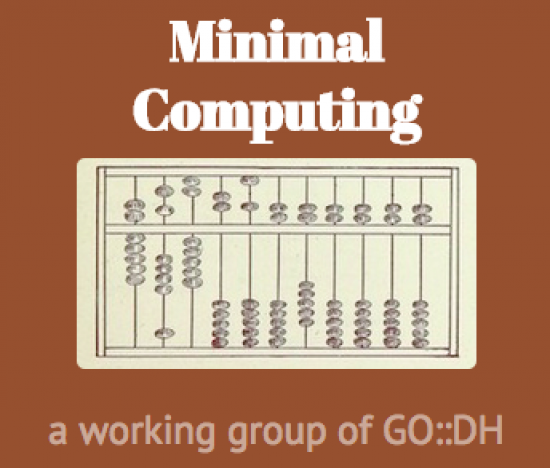Yairamaren Román Maldonado, a graduate student in Spanish & Portuguese with a designated emphasis in New Media, attended the Digital Humanities Summer Institute at the University of Victoria for the second year in a row, after taking “Electronic Literature in the Digital Humanities: Research and Practice” in 2014. This year, she attended two classes, “Digital Humanities with a Global Outlook” and “Advanced Criticism and Authoring of Electronic Literature”. Moving forward with her research on Puerto Rican literature, Yairamaren hopes to combine perspectives from both of these classes.
“Digital Humanities with a Global Outlook”, taught by Alex Gil, combined hands-on activities and critical discussion to explore DH in a variety of contexts. Many DH projects feature computational analysis, querying over large databases, or accessing materials via the internet. In contrast, Gil invited students to consider how DH is conducted in environments with low or no internet connectivity, in communities that are poor or underserved (a particular problem for projects that prioritize public engagement and enrichment), and by scholars who must function under conditions of political repression. In response to these problems, minimal computing, “computing done under some set of significant constraints of hardware, software, education, network capacity, power, or other factors”, offers compelling and critical options.
Yairamaren explored using Jekyll, a static website generator, for making light digital projects that can load quickly on the web or launch directly from a USB thumb drive in offline environments. Though MySQL databases (like the one that powers this website) offer us complex and robust ways of building relationships between many objects, they require more infrastructure and configuration than static HTML sites, and may run frustratingly slowly with a slow internet connection.
Yairamaren also engaged with the problem of sustainable authorship. Though Word documents have long been a staple of academic and administrative work, these proprietary formats and the tools that open them may become outdated, unsupported, and ultimately inaccessible. Instead, Yairamaren learned about authoring files in plain text editors (for which there are many free, open source options) and using sustainable, human-readable, and platform independent formats such as Markdown. For an extended discussion of these problems, see Dennis Tenen and Grant Wythoff’s tutorial, “Sustainable Authorship in Plain Text using Pandoc and Markdown”, on The Programming Historian.
For Yairamaren, minimal computing considerations are pressing, as she hopes to bring DH inflected practices and tools with her to Puerto Rico, where low internet connectivity and cuts to education funding are an issue. For her dissertation research, Yairamaren hopes to begin building a database of Puerto Rican literary works. Many of these print works, produced in small printings of 100 copies, are in danger of disappearing forever. To allow Puerto Ricans to reclaim these works would require creating light and sustainably authored versions of these works that are also accessible in low-bandwidth conditions, Yairamaren explained.
Yairamaren noted, “I’m interested in looking at digital projects that are not easily accessible, works that might have produced offline and distributed in some other way. There are many ‘offline DH’ projects, but it’s difficult to discover they exist!” In the Caribbean, low bandwidth connections necessitate a variety of channels for offline distribution. For example, Yairamaren explained, in Cuba it is common for films and TV shows to be produced domestically and distributed via USB drive. While she was able to view some of these works online (only after they had been uploaded to YouTube outside of Cuba), she speculates there must be much left to discover.
Working in the other direction, one of Yairamaren’s colleagues, Imanol Aranzadi, is concerned with bringing the wealth of free learning materials now available online to offline learning environments. At the Facundo Bueso School in Puerto Rico, students had access to several computers but low bandwidth connections made using online materials in the classroom unfeasible. Installing KA Lite on the school server, Aranzadi was able to bring free Khan Academy videos, interactive learning materials, and progress tracking to the classroom. Teachers would create the classes and the students would log in as if they were online, but in an offline environment.
After taking Gil’s class, Yairamaren plans to continue engaging with electronic literature from the perspective of minimal computing. “It makes you question a lot of these things,” Yairamaren explained. “As we were sitting in [“Advanced Criticism and Authoring of Electronic Literature”], I wondered, ‘Who is this literature produced for? Is it accessible? Where can you actually read and perform these pieces? How do you preserve these works? In the context of Cuba, where you have a very low bandwidth connection and limited access to the internet, how do you open a big, heavy piece of electronic literature? Is this literature for everyone, or just for some people?’”
===
Learn more about minimal computing at the GO::DH Minimal Computing Working Group.
Interested in attending DHSI next year? DH at Berkeley offers several full tuition scholarships, as well discounted tuition for all UC Berkeley affiliates. Join our mailing list for notifications about upcoming training opportunities.
